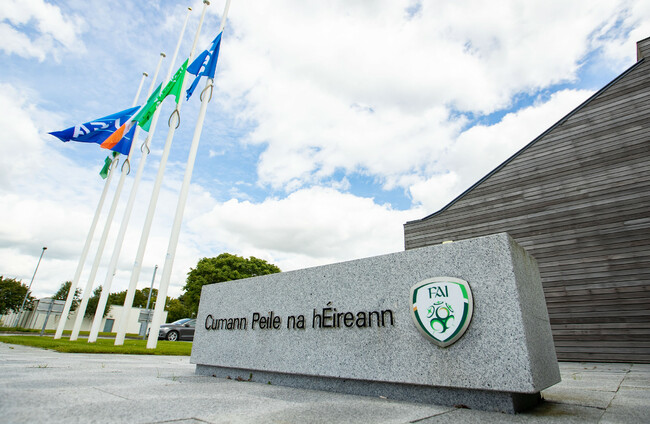SAFEGUARDING IS IN the spotlight after historical abuse allegations rocked Irish football last week.
A joint investigation by RTÉ and The Sunday Independent detailed allegations by female players in the 1990s about unwanted sexual advances, sexual abuse and bullying by a number of male coaches.
The FAI is “appalled” by the allegations and is treating them “with the utmost priority and seriousness”.
A Garda investigation is underway, and three coaches — who were named in RTÉ Inverstigates: Girls In Green and in a series of articles — have been issued with “stand down orders” by the FAI.
Minister for Sport Thomas Byrne described Girls In Green as a “harrowing” and “very important programme” afterwards, and highlighted the importance of safeguarding.
“Justice must now take its course, and I am very mindful that a Garda investigation is underway at present,” Minister Byrne wrote on X, formerly Twitter.
“In every sport, safeguarding must be paramount, and I will be working with Sport Ireland to ensure that everything that should be done in Ireland today regarding safeguarding is actually being done.”
Sinn Féin TD Chris Andrews is among those calling for FAI safeguarding procedures to be reviewed.
“While women’s football in this country has come a long way in recent years, it is crucially important for the safety of all involved that the maximum safeguarding procedures are in place and enforced, and that there are clear and robust avenues for people to come forward to report instances of abuse or inappropriate behaviour,” Andrews, the party’s spokesperson on sport, said.
“The legacy of this investigation must be to ensure that nothing like this is ever allowed to happen again. We owe it to the courageous whistleblowers, as well as to current and future generations, to ensure that Irish football is a safe and respectful environment for all involved.”
The FAI Child Welfare and Safeguarding Policy is available to read here.
There is a ‘safeguarding’ section on the FAI website which details current protocols in place. The Children First Act 2015 has provided a framework, and is referenced several times throughout.
All coaches and volunteers at FAI accredited clubs must be Garda vetted; have completed safeguarding training; and comply with child welfare and safeguarding policies and procedures.
Safeguarding officers must be appointed at all grassroots clubs and leagues, while child safeguarding statements should be visible at all facilities.
A new campaign, Play It Right, was launched last week in association with independent service Raiseaconcern. Six further contacts have been made to the helpline since it has been launched.
“The FAI has strict safeguarding policies in place along with mandatory Garda Vetting and safeguarding training for all coaches and volunteers,” the Association stressed as it launched last week.
“There are no grey areas when it comes to proper conduct and acceptable behaviour. On top of the normal FAI reporting procedures, the FAI has linked up with Raiseaconcern to provide a confidential independent helpline for anyone who wishes to report a concern anonymously.”
Just how strictly are the safeguards enforced? While the FAI appear to have improved their measures, the onus is largely on clubs and individuals.
Coach-player relationships
Coach-player relationships is one area that is not yet clearly defined in domestic and grassroots football policies.
It was confirmed at a media briefing on Monday that the FAI is looking at introducing a “hard and fast rule” regarding coach-player relationships in the Women’s National League.
The FAI sent out a new Player and Staff Welfare policy document to all international players and staff earlier this year, which details that “no employee should be directly or indirectly in authority over another with whom they may have a personal relationship.”
If a personal relationship is formed, it must be revealed to a manager “as soon as possible so that any conflict of interest can be managed,” while the “coach or employee shall be subject to disciplinary action, up to and including dismissal” if the policy is violated.
Player-coach relationships are particularly topical after Leicester City Women’s manager Willie Kirk was sacked in March following an investigation into an alleged relationship with one of his players.
Former Chelsea and current USA WNT manager Emma Hayes said player-coach relationships were “inappropriate” at the time. (Hayes also said player-player relationships were “inappropriate” but later regretted that comment.)
FAI Interim CEO David Courell was asked about player-coach relationships at yesterday’s briefing.
“The association has the handbook that’s been in place since 2013 and it is quite clear in that employee handbook that any amorous relationships between a coach and player or student are fundamentally prohibited,” he said.
“While we’re always looking to evolve our policies, I want to reassure everybody that we have already for quite some time had that clear distinction in place.”
“Within the WNL, we’ve been very clear with all of our clubs that best practice is for no relationships to take place,” he added.
“We have communicated that to them and it is at this stage for each club to apply that locally based on the declarations of any relationships. So the best practice is if a relationship does arise, for it to be disclosed and for that to be discussed within the club environment.
“In time we are looking at introducing it as a hard and fast rule through our Club Licensing structures. But as for now, we have been able to communicate very clearly with all clubs that best practice is no relationship should exist between player and coach. With that said, it’s up to clubs to interpret that on a local basis.”
FAI People and Culture Director Aoife Rafferty confirmed that Women’s National League clubs currently don’t have to report relationships to the Association.
“Education and awareness” is key to protection at grassroots and domestic level, she added.
“What we are actually going to do over the coming months is to go out and create safeguarding and educational awareness campaigns. As part of all of that, we will have direct conversations with all of those involved in a position of authority to educate them on appropriate relationships.
“We are committed to going out and working with everyone to call out and understand what is right and what is wrong. The policies and procedures will not help, they will provide protective measures, but actually going and working with those clubs is what we need to do. We would work with the club to make sure they have appropriate employment processes in place and disciplinary processes to what we have in the FAI.”
- With reporting from Rónán Duffy




